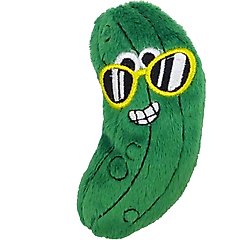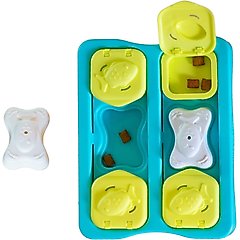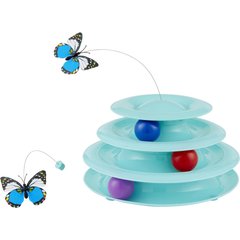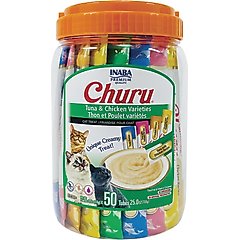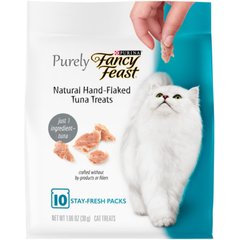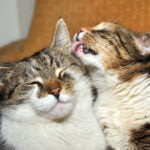Why Are Cats Scared of Cucumbers?
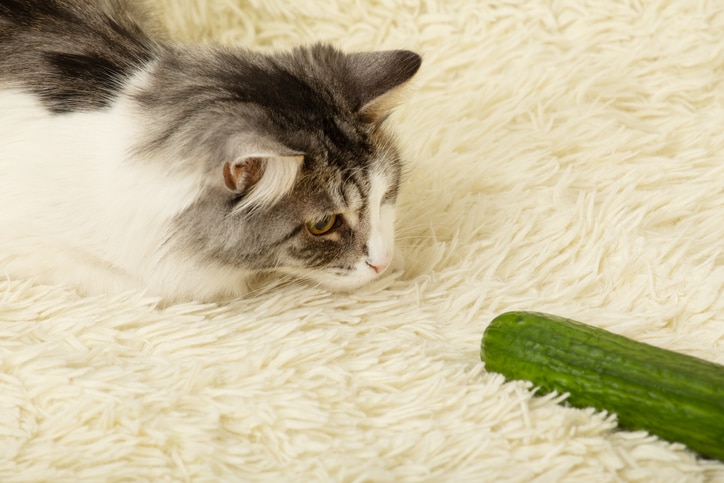
Photo by lekcej / iStock / Getty Images Plus
Ah, the unassuming cucumber—friend to salad lovers, spa goers, and pickle fans, but potential foe to the feline nation.
They’ve shown up at farmers’ markets, in healthy bowls, and as falafel garnishes, but they’ve also been used as props in viral videos starring unsuspecting cats. But why are cats scared of cucumbers? And is there any harm in seeing how your cat reacts to one?
Why Do Cats Get Afraid?
In the wild, cats are both predators and prey, and that “prey animal” mindset has never left your domestic cat.
Instinctively, cats are wired to be hyperaware of their surroundings because their survival depends on it, explains Sarah Cortright, DVM, veterinarian and chief medical director for the Underdog Community Project in Los Angeles. This includes movements, sounds, and smells.
“Sudden changes or unfamiliar objects often trigger their startle reflex, which is a survival technique meant to keep them safe from potential threats,” Dr. Cortright explains. “This is why even the most confident cat can dart away or puff up when surprised. It’s just biology doing its job.”
Common instinctual fears include:
- Loud or sudden noises (like vacuum cleaners or fireworks)
- Fast or unpredictable movements
- Strange objects or environments (including cucumbers, bananas, and tinfoil)
- Large animals or even unpredictable humans (like toddlers)
- Being approached from behind, like when they’re snacking
Why Are Cats Afraid of Cucumbers?
If you’ve seen a video of a cat leaping at the sight of a cucumber, then it’s only natural to wonder how this green veggie became their nemesis: Why do cats hate cucumbers, exactly? Dr. Cortright says while they might seem funny, those cats’ reactions are really rooted in fear and confusion.
“The reaction can range from a quick jump to a full-blown flight response with scrambling, hissing, or crashing into things—none of which is healthy or safe,” she says.
Cats are scared by cucumbers for a few reasons:
- Surprise factor: Cucumbers in videos are usually placed behind a cat while they’re distracted—often while eating, Dr. Cortright says. When they turn around, they’re likely startled by the new, unexpected thing in their environment.
- Resemblance to snakes: Some behaviorists theorize that the long, curved shape may resemble a snake, one of a cat’s natural predators. That’s enough to trigger a panic response.
- Unfamiliar object: Dr. Cortright says that cats prefer predictability, so they don’t appreciate surprises and perceive them as potential threats (like when you rearrange the furniture).
Why You Shouldn’t Scare Your Cat
It may seem harmless, but pranking your cat isn’t the best move to make as a pet parent.
“It might make for a viral video, but it’s not worth the cost to your cat’s well-being,” Dr. Cortright says.
Irith Bloom, CPDT-KSA, director of training at The Sophisticated Dog in Los Angeles, agrees that cats and cucumbers don’t mix. She notes that your cat could end up insecure, anxious, or fearful of a specific room or area where the prank occurred.
“Pranking cats this way clearly causes them stress, and that stress—and the resulting emotional trauma—could potentially last a long time,” Bloom explains.
There’s also a risk of injury since a cat startled into fleeing might crash into furniture, slip on slick floors, or injure themselves trying to escape.
Instead of a prank, get a genuinely joyful reaction from your cat by offering cat toys (perhaps even a cucumber-shaped toy), puzzle feeders, or fun games.
Recommended Products
Whichever toy or game you choose, your cat’s likely to adore it—and it’ll help strengthen your bond (instead of scaring your favorite creature in the world).
If your cat tends to get startled easily (especially if they’re young), you can gently expose them to new sights and experiences through positive reinforcement-based socialization and training. Provide your cat with new foods, cat treats, and experiences in ways that don’t startle them.
Recommended Products
Why Are Cats Scared of Cucumbers FAQs
Q: Are cucumbers toxic to cats?
A: Cucumbers are not toxic to cats. They’re safe for cats to eat in small amounts and are even hydrating, due to their high water content. Still, cucumbers should only be an occasional treat and chopped into small pieces beforehand.
Attributions
This content was medically reviewed by Hannah Hart, DVM, Chewy veterinarian.

